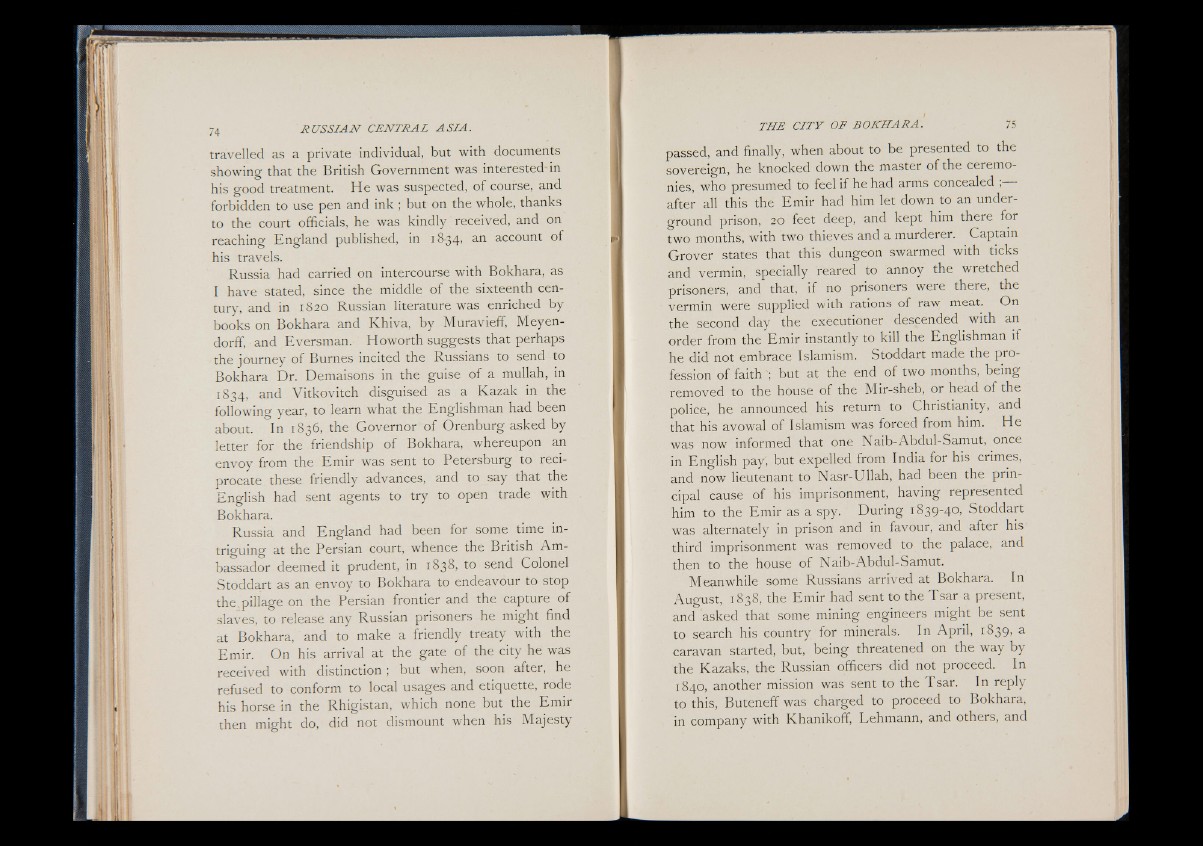
travelled as a private individual, but with documents
showing that the British Government was interesteddn
his good treatment. He was suspected, of course, and
forbidden to use pen and ink; but on the whole, thanks
to the court officials, he was kindly received, and on
reaching England published, in 1834» an account of
his travels.
Russia had carried on intercourse with Bokhara, as
I have stated, since the middle of the sixteenth century,
and in 1820 Russian literature was enriched by
books on Bokhara and Khiva, by Muravieff, Meyen-
dorff, and Eversman. Howorth suggests that perhaps
the journey of Burnes incited the Russians to send to
Bokhara Dr. Demaisons in the guise of a mullah, in
1834, and Vitkovitch disguised as a Kazak in the
following year, to learn what the Englishman had been
about. In 1836, the Governor of Orenburg asked by
letter for the friendship of Bokhara, whereupon an
envoy from the Emir was sent to Petersburg to reciprocate
these friendly advances, and to say that the
English had sent agents to try to open trade with
Bokhara.
Russia and England had been for some time intriguing
at the Persian court, whence the British Ambassador
deemed it prudent, in 1838, to send Colonel
Stoddart as an envoy to Bokhara to endeavour to stop
the. pillage on the Persian frontier and the capture of
slaves, to release any Russian prisoners he might find
at Bokhara, and to make a friendly treaty with the
Emir. On his arrival at the gate of the city he was
received with distinction; but when, soon after, he
refused to conform to local usages and etiquette, rode
his horse in the Rhigistan, which none but the Emir
then might do, did not dismount when his Majesty
passed, and finally, when about to be presented to the
sovereign, he knocked down the master of the ceremonies,
who presumed to feel if he had arms concealed ;
after all this the Emir had him let down to an underground
prison, 20 feet deep, and kept him there for
two months, with two thieves and a murderer. Captain
Grover states that this dungeon swarmed with ticks
and vermin, specially reared to annoy the wretched
prisoners, and that, if no prisoners were there, the
vermin were supplied with rations of raw meat. On
the second day the executioner descended with an
order from the Emir instantly to kill the Englishman if
he did not embrace Islamism. Stoddart made the profession
of faith ; but at the end of two months, being
removed to the house of the Mir-sheb, or head of the
police, he announced his return to Christianity, and
that his avowal of Islamism was forced from him. He
was now informed that one Naib-Abdul-Samut, once
in English payj but expelled from India for his crimes,
and now lieutenant to Nasr-Ullah, had been the principal
cause of his imprisonment, having represented
him to the Emir as a spy. During 1839-40, Stoddart
was alternately in prison and in favour, and after his
third imprisonment was removed to the palace, and
then to the house of Naib-Abdul-Samut.
Meanwhile some Russians arrived at Bokhara. In
August, 1838, the Emir had sent to the Tsar a present,
and 'asked that some mining engineers might be sent
to search his country for minerals. In April, 1839, a
caravan started, but, being threatened on the way by
the Kazaks, the Russian officers did not proceed. In
1840, another mission was sent to the Tsar. In reply
to this, Buteneff was charged to proceed to Bokhara,
in company with Khanikoff, Lehmann, and others, and